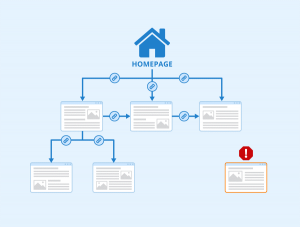
Orphan pages and their impact on SEO
As we know, there are many website elements both technical and non-technical that can have an impact on SEO, one of these are Orphan pages. In this article we’re going to discuss what Orphan pages are and how they can impact SEO negatively.
What are Orphan pages?
They are isolated pages that do not have any internal links pointing to them from other pages of the website, or from any form of navigation. These pages will not be listed in the XML or HTML sitemap and are usually only discovered via running a crawl of the website using a tool.

What are the possible problems with Orphan pages?
Orphan pages can create an array of issues, from poor user experience to search engine spider crawling limitations. We have mainly seen large websites suffer from having Orphan pages – where the site’s indexation/crawling was limited due to undetected Orphan pages.
Here are four of the main issues we regularly find with Orphan pages:
1. Poor User Experience
Orphan pages are not accessible to users because there are no navigational/contextual links pointing to them. Without links, these pages will not be found, resulting in poor user experience as visitors will not be able to access these pages that might contain important and/or valuable content.
2. Crawling Limitations
Search engine spiders need to crawl and index web pages in order to show them in their results pages. But, Orphan pages may not be discovered by these bots if there are no internal links pointing to them. As a result, they may not appear in search engine results pages (SERPs).
3. Negative SEO Performance
Orphan pages are less likely to be indexed and ranked by search engines. They miss out on the potential benefits of internal linking, which can help distribute link equity/authority and improve a website’s overall SEO performance.
4. Content Isolation
Orphan pages may contain valuable content and information that should be accessible to users and search engine spiders. When these pages are isolated (Orphaned), they may not serve their intended purpose or contribute to the website’s overall goals.
How to avoid creating Orphan pages
As part of the website’s SEO workstream there should be regular audits carried out, we do monthly health checks to over key areas:

- Core Web Vitals
- Indexed Pages
- Keyword Rankings
- Internal Linking
- Backlinks Profile
The internal linking, indexed pages and to some extent the backlinks profile audits will highlight any Orphan pages. We can then analyse them and plot a plan of action, but where possible we try to take evasive action and avoid/minimise the chances of having Orphan pages.
Here are four ways to avoid having Orphan pages:
1. Create Internal Links
Identify orphan pages and create internal links to them from relevant pages within the website and update sitemaps (see below). This helps improve navigation and ensures that search engine bots can find and index these pages.
2. Update Sitemaps
Ensure that orphan pages are included in the website’s XML and HTML sitemap, which acts as an index of all pages for search engines to crawl and index.
3. Remove Unnecessary Pages
If orphan pages are outdated or no longer needed then consider removing them from the website to streamline its structure. This will in turn result in more efficient use of the crawl budget allocated to the site by search engines.
4. Regularly Audit Website Structure
Conduct periodic audits of your website’s structure and internal linking to prevent new orphan pages from emerging. Depending on the size and frequency of content being uploaded, doing this monthly is a good idea.
Orphan pages are just one factor that can impact your website, for a full technical audit and SEO analysis get in touch with us.
 Pinterest
Pinterest Twitter
Twitter Facebook
Facebook

